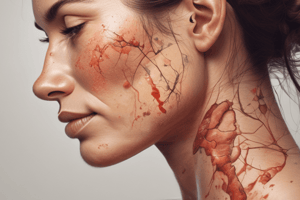Podcast
Questions and Answers
Which medication is NOT commonly used in the treatment of psoriasis?
Which medication is NOT commonly used in the treatment of psoriasis?
- Cyclosporine
- Hydroxyurea
- Methotrexate
- Acetaminophen (correct)
What is a common precaution for patients undergoing treatment for psoriasis?
What is a common precaution for patients undergoing treatment for psoriasis?
- Avoid outdoor exposure to sunlight
- Report any aggravating infections (correct)
- Increase frequency of skin washing
- Use emollients excessively
Which area of the body is least likely to be affected by acne vulgaris?
Which area of the body is least likely to be affected by acne vulgaris?
- Back
- Chest
- Palms (correct)
- Face
Which of the following is NOT a recommended nursing management practice for psoriasis?
Which of the following is NOT a recommended nursing management practice for psoriasis?
Which statement best describes the pilosebaceous unit in relation to acne vulgaris?
Which statement best describes the pilosebaceous unit in relation to acne vulgaris?
Which method is recommended to manage skin drying in psoriasis patients?
Which method is recommended to manage skin drying in psoriasis patients?
Which area is least likely to be affected by seborrheic dermatitis?
Which area is least likely to be affected by seborrheic dermatitis?
Which treatment is most appropriate for severe seborrheic dermatitis that appears to be infected?
Which treatment is most appropriate for severe seborrheic dermatitis that appears to be infected?
What is a characteristic feature of psoriasis?
What is a characteristic feature of psoriasis?
What role does the immune system play in psoriasis?
What role does the immune system play in psoriasis?
Which of the following is NOT a proposed cause of psoriasis?
Which of the following is NOT a proposed cause of psoriasis?
What is the most common age range for the onset of psoriasis?
What is the most common age range for the onset of psoriasis?
What is a common treatment option for dandruff?
What is a common treatment option for dandruff?
Which of the following statements about seborrheic blepharitis is correct?
Which of the following statements about seborrheic blepharitis is correct?
Which of the following factors is most likely to induce skin lesions associated with psoriasis?
Which of the following factors is most likely to induce skin lesions associated with psoriasis?
What is a common clinical manifestation of psoriasis when scales are scraped away?
What is a common clinical manifestation of psoriasis when scales are scraped away?
Which area of the body is least likely to show psoriasis lesions?
Which area of the body is least likely to show psoriasis lesions?
In psoriasis, which of the following complications can occur?
In psoriasis, which of the following complications can occur?
Which cytokine-related factor is known to be exacerbated by cigarette smoking in psoriasis patients?
Which cytokine-related factor is known to be exacerbated by cigarette smoking in psoriasis patients?
What is a suggestive finding that supports the diagnosis of psoriasis?
What is a suggestive finding that supports the diagnosis of psoriasis?
Which of the following symptoms may indicate nail involvement in psoriasis?
Which of the following symptoms may indicate nail involvement in psoriasis?
What type of emotional factor can trigger the onset of psoriasis lesions?
What type of emotional factor can trigger the onset of psoriasis lesions?
Flashcards are hidden until you start studying
Study Notes
Aggravating / Triggering Factors
- Emotional stress can lead to inflammation.
- Anxiety and trauma can induce scratching of the skin.
- Infections trigger cytokine release, affecting cell production.
- Seasonal changes, particularly cold and dry winters, exacerbate symptoms.
- High estrogen levels due to hormonal changes can aggravate the condition.
- Cigarette smoking and alcohol consumption increase cytokine levels.
- Nonsteroidal anti-inflammatory drugs may worsen symptoms.
Clinical Manifestation
- Lesions present as dark red, raised plaques covered with silvery scales.
- Scraping scales away reveals multiple bleeding points.
- Patches are typically dry and not itchy.
- Pustular lesions may develop on palms and soles.
- Lesions often appear symmetrically across the body.
Particular Sites of the Body Affected
- Commonly affected areas include the scalp, elbows, knees, lower back, and genitalia.
- Extensor surfaces of arms and legs, sacrum, and intergluteal fold are also prone.
- Nail involvement can show pitting, discoloration, crumbling, and separation of nail plates.
Diagnostic Findings
- Diagnosis is confirmed with the presence of classic plaque-type lesions.
- Nail and scalp involvement, along with family history, are also considered.
Complications
- Psoriasis can be associated with arthritis, though the relationship is not fully understood.
- Erythrodermic psoriasis, affecting the entire body, can arise from chronic psoriasis, infections, or medication withdrawal.
- Systemic therapy options include methotrexate, cyclosporine, hydroxyurea, retinoids, and antibiotics.
Nursing Management
- Instruct patients to avoid scratching psoriatic areas and potential irritants.
- Encourage reporting of infections that may worsen psoriasis.
- Caution patients regarding medications that could aggravate the condition.
- Promote a balanced lifestyle with recreation, exercise, and adequate rest.
- Suggest practices to prevent skin dryness, such as limiting washing and using emollients.
- Advise sun exposure for its potential benefits.
Acne Vulgaris
- Acne vulgaris is a chronic, inflammatory disease of the pilosebaceous units (hair, follicle, and sebaceous gland).
- It primarily affects the face, chest, and back, particularly in individuals aged 12 to 35.
- Skin lesions typically appear as greasy scales over red, inflamed skin.
Clinical Presentation of Acne Vulgaris
- Distribution of lesions often follows oily and hair-bearing areas: scalp, forehead, eyebrows, lash line, nasolabial folds, beard, and postauricular skin.
- Secondary infections may occur, leading to more complicated skin conditions.
Treatment of Acne Vulgaris
- Topical corticosteroids, creams, and lotions are commonly used first-line treatments.
- Severe cases may require systemic ketoconazole or medicated shampoos.
- Dandruff can improve with more frequent shampooing; effective ingredients include salicylic acid, tar, selenium, sulfur, and zinc.
- Infected acne may necessitate antibiotic treatment.
Studying That Suits You
Use AI to generate personalized quizzes and flashcards to suit your learning preferences.



